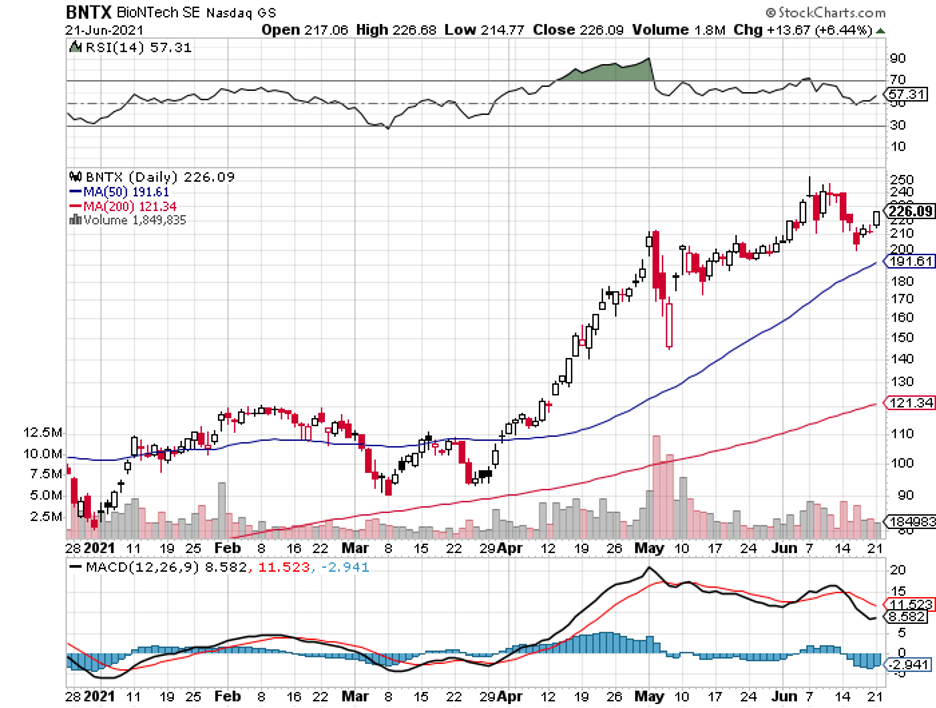Not Your Average One-Hit Wonder
It was only a few months ago when investors believed that COVID-19 developers like Moderna (MRNA) and BioNTech (BNTX) had enjoyed their best performances.
With the uncertainty returning, many figured that the profits and revenues for these stocks have dried up as well.
This isn’t the case these days, though. If anything, it looks like these companies have incredibly bright futures ahead.
BioNTech, in particular, shows tremendous promise after emerging as one of the most compelling success stories in the scientific world during the pandemic.
Working alongside Pfizer (PFE), this German biotechnology company created the first-ever vaccine that utilized messenger RNA to receive authorization across the globe.
Since being a first mover in the COVID-19 vaccine race, BioNTech has established a strong financial position that gave it the capacity to pursue other breakthrough treatments in its pipeline.
Moreover, the general sentiment toward BioNTech remains positive thanks to the effectiveness of its vaccine.
Just last month, the US Centers for Disease Control and Prevention disclosed the latest data on the efficacy of mRNA-based vaccines. It showed an impressive 91% reduction rate in terms of infections based on real-life reports.
The sustained demand for COVID-19 vaccines also translated to an outpouring of orders, with BioNTech recently completing another agreement with New Zealand and even the Philippines.
Health officials are also looking into the need for booster shots, which means it’s entirely possible that a whole new revenue stream could open up for BioNTech once again.
In the first quarter of 2021, revenues from BioNTech’s share from the COVID-19 vaccine marketed alongside Pfizer amounted to over $3.5 billion, including milestone payments.
This puts it on track to reach the $8.3 billion revenues estimated from the vaccine alone in 2021.
Apart from its agreement with Pfizer, this German biotech has been ramping up its own production. So far, it anticipates selling roughly 250 million doses of the COVID-19 vaccine in the first half of 2021.
Let’s say that each dose is sold at $14, and BioNTech could sustain its manufacturing capacity until December, then it can supply a total of 500 million doses.
That would rake in $7 billion in direct revenue.
On top of these, BioNTech has a separate deal with China’s Fosun Pharma.
This means that the earlier estimate of $15 billion in revenue for BioNTech this year is definitely feasible.
However, that’s a conservative estimate.
BioNTech intends to expand its manufacturing capacity to produce 3 billion doses by the end of 2021 and more by 2022.
By next year, the entire world comprising 7 billion people would be eligible to take the vaccine shots as approvals get rolled out.
Even with the competition, BioNTech stands to cover at least 30% market share or roughly 2 billion doses in the years to come.
Despite the expected price reduction to probably $10 per dose, that’s still a whopping $20 billion in annual sales for a biotechnology company with a current market capitalization of $54.10 billion.
Going back to its current deals with bigger biopharmaceutical companies, BioNTech had an impressive first quarter this year, showing off a 7,295% surge in its sales.
Leveraging this massive revenue stream, the company has boosted its pipeline programs and is pushing to ride the momentum.
So far, it has 14 drug candidates queued in clinical trials.
One of the most promising and advanced is its melanoma treatment pipeline, which has two programs slated to advance to Phase 2 within the year.
The first one, BNT111, is a collaboration with Regeneron (REGN), while the other, BNT122, is an approach developed alongside Genentech (DNA).
Aside from these programs, the company has also been busy working on developing mRNA-based treatments for various types of cancers.
If you’re one of the people who thought that the rise of the COVID-19 vaccine stocks is done the moment the entire US population gets vaccinated, then you’re not alone in that assumption.
You’d be surprised though at the strength of the staying power of companies like BioNTech have, especially when some things work out in their favor.
For context, BioNTech is only second to Volkswagen (VWAGY) in terms of profitability in Germany.
That means that a 13-year-old biotech company with fewer than 2,000 employees has grown so much in the past year that it’s now in the same conversation with a company employing over 600,000 people and has a history that predates World War II.
While COVID-19 upended the world, BioNTech has been granted the opportunity to show off its skills and grow its business
From being a virtually unknown company, it has become one of the fastest-growing biotech globally.
Looking at its performance in the past 12 months and its pipeline programs, it’s clear that BioNTech still has so much room for growth.


